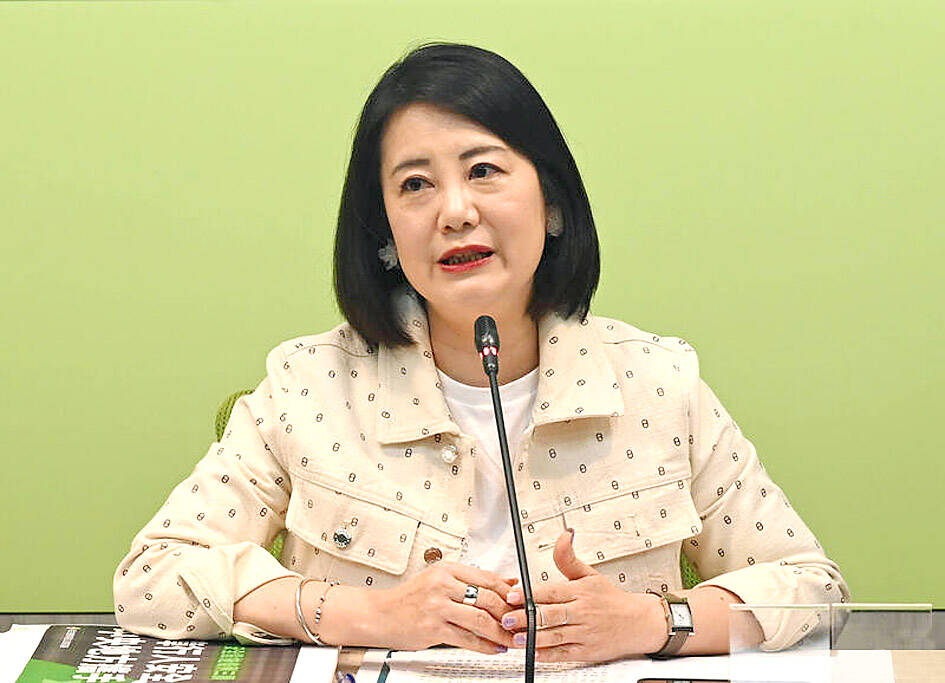Chinese Nationalist Party (KMT) legislators yesterday withdrew a proposal to reduce the pay of employees working during a probationary period, following opposition from youth and labor groups, while a Democratic Progressive Party (DPP) lawmaker criticized it as a copy of a Chinese law.
KMT lawmakers, led by Legislator Niu Hsu-ting (牛煦庭), sought to amend the Labor Standards Act (勞動基準法) to allow employers to cut to 80 percent the standard wage for new workers during their probationary period.
Critics said the measure would exacerbate the already low wages of young workers, while legitimizing an exploitative practice.

Photo: Chen Cheng-yu, Taipei Times
DPP Legislator Wang Ting-yu (王定宇) said the KMT lawmakers intention with the bill was to duplicate China’s labor laws, to transform Taiwan’s social and legal framework to match that of China.
Niu’s proposal is a direct copy of Article 15 of the China’s Employment Contract Law, Wang said.
“It is laughable to copy from China, as its laws are restrictive and lag behind the rest of the world,” DPP Legislator Rosalia Wu (吳思瑤) said, adding that when seeking ideas for bills, the KMT lawmakers should look at advanced countries and progressive legislation.
Wu questioned whether the KMT was receiving instruction from Beijing upon the return of a delegation of 17 lawmakers led by KMT caucus whip Fu Kun-chi from a visit to China last week.
Meanwhile, Fu used his authority as party caucus whip to force the alteration of the wording on a separate item to “mainland” instead of “China.”
During a session of the legislature’s Internal Administration Committee, DPP legislators raised a motion on government agencies evaluating requests for allowing Taiwanese tour groups to visit China while China continues to engage in acts of military intimidation.
At the direction of Fu, KMT legislators used their majority in the committee to change the word “China” to “mainland” in a sentence stating that Taiwan had not received a response from China. In another sentence that said China had moved the M503 flight path to be “closer to our nation’s restricted airspace,” the word “nation” was changed to “Taiwan.”

Three Taiwanese airlines have prohibited passengers from packing Bluetooth earbuds and their charger cases in checked luggage. EVA Air and Uni Air said that Bluetooth earbuds and charger cases are categorized as portable electronic devices, which should be switched off if they are placed in checked luggage based on international aviation safety regulations. They must not be in standby or sleep mode. However, as charging would continue when earbuds are placed in the charger cases, which would contravene international aviation regulations, their cases must be carried as hand luggage, they said. Tigerair Taiwan said that earbud charger cases are equipped

Foreign travelers entering Taiwan on a short layover via Taiwan Taoyuan International Airport are receiving NT$600 gift vouchers from yesterday, the Tourism Administration said, adding that it hopes the incentive would boost tourism consumption at the airport. The program, which allows travelers holding non-Taiwan passports who enter the country during a layover of up to 24 hours to claim a voucher, aims to promote attractions at the airport, the agency said in a statement on Friday. To participate, travelers must sign up on the campaign Web site, the agency said. They can then present their passport and boarding pass for their connecting international

UNILATERAL MOVES: Officials have raised concerns that Beijing could try to exert economic control over Kinmen in a key development plan next year The Civil Aviation Administration (CAA) yesterday said that China has so far failed to provide any information about a new airport expected to open next year that is less than 10km from a Taiwanese airport, raising flight safety concerns. Xiamen Xiangan International Airport is only about 3km at its closest point from the islands in Kinmen County — the scene of on-off fighting during the Cold War — and construction work can be seen and heard clearly from the Taiwan side. In a written statement sent to Reuters, the CAA said that airports close to each other need detailed advanced

The age requirement for commercial pilots and airline transport pilots is to be lowered by two years, to 18 and 21 years respectively, to expand the pool of pilots in accordance with international standards, the Ministry of Transportation and Communications announced today. The changes are part of amendments to articles 93, 119 and 121 of the Regulations Governing Licenses and Ratings for Airmen (航空人員檢定給證管理規則). The amendments take into account age requirements for aviation personnel certification in the Convention on International Civil Aviation and EU’s aviation safety regulations, as well as the practical needs of managing aviation personnel licensing, the ministry said. The ministry